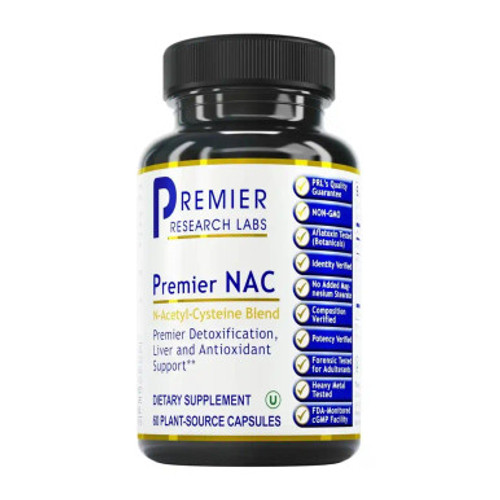NAC by Xymogen
N-acetyl-l-cysteine (NAC) by Xymogen is an amino acid supplement that provides L-cysteine, which is crucial for the tripeptide glutathione.* Its effects may be visible in anti-oxidation, which should improve after taking this product.*
Who May Consider NAC by Xymogen?
NAC by Xymogen may support your health if you:
- seek anti-oxidant support*
- have respiratory concerns*
- experience a lot of stress*
How May n-acetyl-l-cysteine (nac) by Xymogen Affect Your Health?
Xymogen’s NAC may have the following health benefits:
- supporting glutathione synthesis*
- promoting anti-oxidant activity in all body cells*
- supporting respiratory function*
- supporting immunity*
Supplements support your health but do not replace a balanced diet. Always check with your healthcare practitioner if you have doubts about a new supplement. Book a FREE product consultation to learn more about this supplement.
Recommendation:
Take one to two capsules twice daily between meals, or as directed by your healthcare practitioner.
Serving Size: 2 Capsules
Servings Per Container: 30 or 60
Amount Per Serving:
N-Acetyl-L-Cysteine 1.2 g
Other Ingredients: HPMC (capsule), stearic acid, magnesium stearate, and silica.
Does Not Contain: Wheat, gluten, corn, yeast, soy, animal or dairy products, fish, shellfish, peanuts, tree nuts, egg, ingredients derived from genetically modified organisms (GMOs), artificial colors, artificial sweeteners, or artificial preservatives.
Caution: Individuals taking medication should discuss potential interactions with their healthcare practitioner. Do not use if tamper seal is damaged.
Storage: Keep closed in a cool, dry place out of reach of children.
*These statements have not been evaluated by the FDA. This product is not intended to diagnose, treat, cure, or prevent any disease.
LEGAL NOTICE: Xymogen's Exclusive Professional Formulas are available through select licensed health care professionals. The Internet Sale and Discounting of XYMOGEN formulas are strictly prohibited.
References:
- Krinsky, D. L., LaValle, J. B., Hawkins, E. B., & et al. (2003). Natural therapeutics pocket guide (2nd ed.). Lexi-Comp.
- Grandjean, E. M., Berthet, P., Ruffmann, R., & Leuenberger, P. (2000). Efficacy of oral long-term N-acetylcysteine in chronic bronchopulmonary disease: A meta-analysis of published double-blind, placebo-controlled clinical trials. Clinical Therapeutics, 22(2), 209-221. https://doi.org/10.1016/S0149-2918(00)80005-5
- Yalçin, E., Altin, F., Cinhüseyinoglu, F., & et al. (2002). N-acetylcysteine in chronic blepharitis. Cornea, 21(2), 164-168. https://doi.org/10.1097/00003226-200203000-00009
- Ottenwalder, H., & Simon, P. (1987). Differential effect of N-acetylcysteine on excretion of the metals Hg, Cd, Pb and Au. Archives of Toxicology, 60(5), 401-402. https://doi.org/10.1007/BF00314782
- Keogh, J. P., Steffen, B., & Siegers, C. P. (1994). Cytotoxicity of heavy metals in the human small intestinal epithelial cell line I-407: The role of glutathione. Journal of Toxicology and Environmental Health, 43(3), 351-359. https://doi.org/10.1080/009841094160956
- Witschi, A., & et al. (1992). The systemic availability of oral glutathione. European Journal of Clinical Pharmacology, 43, 667-669. https://doi.org/10.1007/BF00187204
- De Rosa, S. C., & et al. (2000). N-acetylcysteine replenishes glutathione in HIV infection. European Journal of Clinical Investigation, 30(10), 841-842. https://doi.org/10.1046/j.1365-2362.2000.00799.x
- Atkuri, K. R., Mantovani, J. J., Herzenberg, L. A., & et al. (2007). N-Acetylcysteine—a safe antidote for cysteine/glutathione deficiency. Current Opinion in Pharmacology, 7(4), 355-359. https://doi.org/10.1016/j.coph.2007.05.001
- White, A.C., Thannickal, V.J., & Fanburg, B.L.(1994). Glutathione deficiency in human disease.Journal of Nutritional Biochemistry, 5, 218-226.http://www.sciencedirect.com/science/article/pii/0955286394900396
- Pace, G.W., & Leaf C.D.(1995). The role of oxidative stress in HIV disease.Free Radical Biology and Medicine, 19, 523-528.http://doi.org/10.1016/0891-5849(95)00053-A
- Favier, A., Sappey, C., Leclerc, P., & et al.(1994). Antioxidant status and lipid peroxidation in patients infected with HIV.Chemical Biology Interactions, 91(2-3),165-180.http://doi.org/10.1016/0009-2797(94)90092-X
- Nakamura, H., Masutani, H., & Yodoi J.(2002). Redox imbalance and its control in HIV infection.Antioxidants and Redox Signaling, 4(3),455-464.http://doi.org/10.1089/152308602320263580
13.Roberts R.L., Aroda V.R., Ank B.J.(1995). N-acetylcysteine enhances antibody-dependent cellular toxicity in neutrophils and mononuclear cells from healthy adults and human immunodeficiency virus-infected patients.Journal of Infectious Diseases,172(6),1492-1502.http://doi.org/10.1093/infdis/172.6.1492
14.Hu H.L., Forsey R.J., Blades T.J., & et al.(2000). Antioxidants may contribute in the fight against ageing: An in vitro model.Mechanisms of Ageing and Development,121(1-3),217-230.http://doi.org/10.1016/S0047-6374(00)00155-X








